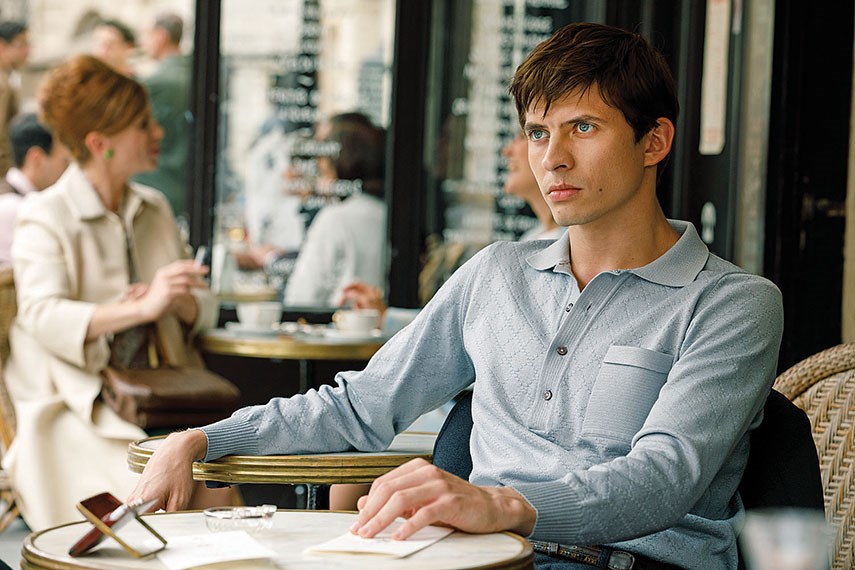The White Crow. Directed by Ralph Fiennes. Starring Oleg Ivenko, Ralph Fiennes and Adele Exarchopoulos. Rating: 7 (out of 10)
“Only through discipline can you find freedom,” young Rudolf Nureyev is instructed. The ballet dancer embraces both in Ralph Fiennes’ portrait of the artist as a young man poised to be the famously difficult legend he would become.
Nureyev was on his way to cloistered fame behind the Iron Curtain but became the first true male superstar of ballet after he defected to France in 1961. Fiennes, in his third feature as director, tells Nureyev’s story, from his impoverished childhood in the city of Ufa to the unnerving standoff at Le Bourget airport in Paris, though not necessarily in that order.
Nureyev was born in the U.S.S.R. in 1938, on a train and into poverty, and reportedly didn’t own shoes until the age of five. A chance visit to the opera, in which the entire family snuck in on one ticket, provided little Rudik (played by Maksimilian Grigoriyev) with his life’s purpose.
But Rudi was a late bloomer, and wasn’t accepted into the ballet academy until age 17. He had an inauspicious start, having to cram six years of training into three, and dancing with a chip on his shoulder about his lowly upbringing.
Ukrainian dancer Oleg Ivenko plays adult Nureyev. Ivenko had never acted, and who better than Fiennes to give him a crash-course on the craft? Fiennes is wildly popular in Russia, thanks to his faithful portrayals of Evgeny Onegin (in Onegin, directed by his sister Martha) and Mikhail Ratkin (in Two Women). All his dialogue is in Russian, as is most of the film. Ivenko captures the fastidious dedication Nureyev had for his craft and well as his decided inattention to everything and everyone else.
The film renders a luminous re-creation of France in 1961, where ladies’ lipstick and frocks pop in technicolour. The Kirov Ballet has been invited to perform and it’s Rudi who bridges the gulf between the Eastern and Western troupes, befriending French dancers Claire Motte (Calypso Valois) and Pierre Lacotte (Raphaël Personnaz). “It’s not going to take long until everyone knows who I am,” he says confidently, arrogantly. They show Paris to a wide-eyed Rudi, who is always one step ahead of his KGB babysitter.
They also introduce him to socialite Clara Saint (Adele Exarchopoulos), who has been medicated since the sudden death of her boyfriend. “I am better than Valium” Rudi announces, and it’s true: Clara only enlivens when she watches Rudi dance. It’s Clara who will be key in Rudi’s defection, despite his rudeness and seeming indifference towards her. “I forgive you for being the most selfish man I ever met,” she says.
But before there was Paris there was Pushkin, played with a paunch and retreating hairline by Fiennes. Alexander Pushkin was a gentle genius of an instructor. He and his wife Xenia (Chulpan Khamatova) take Rudi in to their shoebox flat after he suffers a catastrophic injury; the dancer’s rehab includes a cozy sleeping arrangement that leads to an “inevitable” affair.
Fiennes runs with the prevailing theory that Nureyev really had no premeditated notion of defecting, but that the overbearing KGB officers, and the threat of punishment, made him decide to abandon his homeland at the last minute. That “dash to freedom” was really just a few steps – Fiennes counts them out – but they were steps that made headlines around the world. (Lest we think that things have changed drastically in Russia since the wall came down, keep in mind that the freedom enjoyed in 1960s Paris – men dancing with other men, women with women – is still more or less illegal in Russia, which in 2018 was ranked the least protective country in Europe for LGBT rights, 49th out of 49.)
The White Crow is not a traditional biopic and those hoping for a foray into Nureyev’s juicy history with the likes of Jackie Onassis, Andy Warhol and scores of male and female lovers will leave dissatisfied. The film leaves much open to interpretation. A childhood spent in poverty, but was there abuse, abandonment? A grown Nureyev spends a great deal of time contemplating Gericault’s The Raft of the Medusa in the Louvre, for example, but never articulates what he sees: does it move him, or is it a part of his perfectionist nature to round out his dance artistry?
The White Crow captures the rigors, sweat and rewards of a life lived in pursuit of art but the human connection is absent. Ultimately, we find we’re waiting for the next dancing sequence and the confrontation at the airport, all else is interesting but falls short of rewarding.



